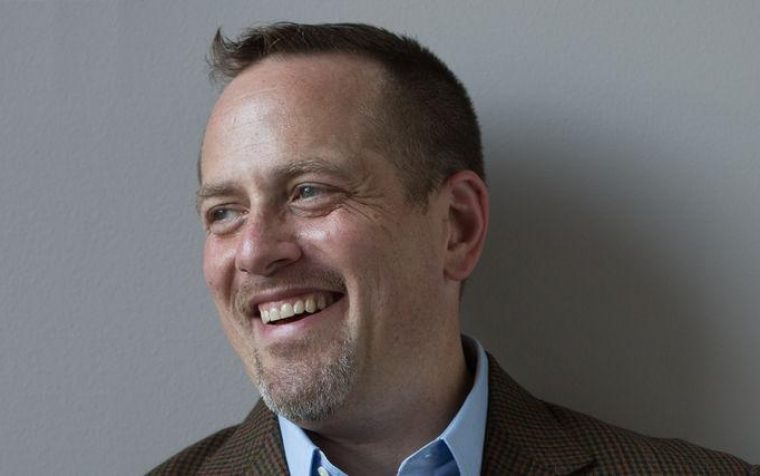With a varied career involving high-achieving people in music, sports, business, and education, Daniel Lerner understands how passion can manifest itself in different ways. As a music agent, Lerner wondered why some of his clients found ways to be both successful and happy and others
did not, leading him to study performance and positive psychology. Now a professor at New York University, Lerner co-teaches the popular “The
Science of Happiness” course—where he helps students understand how passions, hobbies, and the various pursuits of our lives play a role in our
everyday happiness. Lerner shared more about the coexistence of ambition and happiness during the Opening MasterMind session at giftED18.
Lacy Compton: Thank you so much for joining us today, Dan! In looking at your work, much of what you do centers on the idea of being “passionately successful.” Can you explain a little bit more about this phrase, especially for those who may not be familiar with it?
Dan Lerner: Our culture tends to define success in a relatively narrow way. When you look at the standard measurements for success, they are things like, “How much money are you making? What status have you achieved there? What kind of rewards? How far have you elevated? What’s on your business card? How far have you been promoted?” And what we’re finding in the research, quite consistently, is that those are not the things that correlate with happiness or, for a richer term, greater well-being. What I’m really interested in is what lies in the crossroads of success and well-being. What are some of the ingredients that allow us to be successful in our careers and in our lives? When I talk about being passionately successful, there are a number of factors at play including but not limited to positive emotions, relationships, meaning, and purpose. I find the research on passion so fascinating because it seems to sit very much at that crossroads. In a very pronounced way, how we pursue things that we’re passionate about plays a huge role in how successful we are, both in our work and in our lives. So the idea of being “passionately successful” is about how passion contributes to the idea of being successful both in the workplace and in our lives overall.
Lacy: How do you think that term and concept apply to teachers and students?
Dan: If we look at what influences students’ definition of success, so much of it is driven extrinsically. Not always. But often. That is to say, “What are my grades? What college did I get into? What college am I going to?” [So students think] I need to have the A’s, I need to have the perfect SAT. And what we’re finding is that while these might correlate with certain levels of short-term positive emotion, they don’t do so with longer term well-being. But when we asked [students] the question, “What are the things that you find most engaging?”, it sparks a very different—and far more compelling— group of answers as a result. Dr. Robert Vallerand at University of Montreal did a study on undergrad theater majors and found that when he divided them into two different categories for passion, one being harmonious passion, which is healthy passion, and the other one being obsessive passion, he found that not only did the students with harmonious passion have more deliberate practice—the kind of practice that Anders Ericsson showed helps us get better—but they were rated more highly by their professors in terms of the skills that they were gaining. Harmonious passion was also strongly correlated with overall satisfaction in life. Not only do we have the opportunity to pursue something that we enjoy, but it improves our lives and it increases the odds of us getting better at that pursuit as well. There are a number of different ways to look at it, but the key for students is that [harmonious passion] allows them an advantage not only in the enjoyment of their life, but in enjoyment of a pursuit outside of their work and the ability to realize the potential in their work as well. Now when it comes to teachers, simply being able to recognize and distinguish a harmonious passion from obsessive passion means that we can identify how [students are] pursuing whatever it is that they’re pursuing. We can look at a student and realize that Mary spends all of her time in the library. She gets straight A’s. She had the perfect SATs. But, she doesn’t have many friends, she doesn’t cultivate many other hobbies or many other interests, she is hell bent on getting to Harvard/Stanford/Yale . . . and nothing else matters. Well, that might land her at that school, but it doesn’t necessarily mean that her teachers are cultivating a student who has well-being, nor are they setting her up to be able to be her very best as years go on. Those students (and anyone who pursues something obsessive) tend to burn out at a much, much higher rate according to research. So how do we help them understand that we can be our very best while also incorporating other pursuits in our life? It’s challenging. For a teacher to be able to distinguish one [type of passion] from the other means they can help cultivate [the desire to incorporate various pursuits] in their students. I’d also argue that for the teachers themselves, understanding passion in terms of how they pursue what’s important to them in their lives can be enormously helpful. We can talk about it all day, but if we don’t role model [well-being] for our students, for our families, for our kids, for people around us, it’s a very different thing. Maybe you’re working 100 hours a week. Never stopping to see your family. Very rarely seeing friends, very rarely pursuing other hobbies. This is what’s likely to happen to you: You’re more likely to have lower levels of positive emotion. You’re more likely to be stressed out. You’re more likely to have lower self-esteem. You’re more likely to burn out. You’re less likely to be focused. Being able to understand it and talk about a few changes you can make to help you get back on that path to really being passionate about your work, but in a healthy, harmonious way, is key—so teachers can live their lives and have longer and more enjoyable careers, which allows them to help more students.
Lacy: You have referred often to both harmonious and obsessive passion. How would you briefly describe these two types of passion?
Dan: Harmonious and obsessive passions are the two styles of passion that have been described by Robert Vallerand, the father of research on passion. Harmonious passion is a way of pursuing passion that allows other things, other pursuits, other people to enhance our lives. If our life is a pie chart, harmonious passion picks up a portion of that pie, but not the whole thing. Obsessive passion is what you’d expect: you’re obsessed over things. Even when you’re not playing your piano, if that’s what your passion is, you’re thinking about it. When you’re out at the movies on a date or you’re home with your family, you mentally are still focused on that passion, you’re obsessed with it, nothing else exists and everything else makes you feel guilty if you pursue it. Harmonious passions are basically doing something that you love. . . .You do it because you love it. With harmonious, we often do it because we love the process. With obsessive, we often do it because we love the win, the money, the status. Is it intrinsically motivated or extrinsically motivated? Is it done because you love the process itself or because you love the outcome? Is it part of your life or is it your whole life?
Lacy: A lot of our teachers work with students who have a lot of ambition and ability. What has your work on passion showed you about expertise and excellence and why harmonious passion is important to excellence?
Dan: For example, if you’re aiming for med school because your parents want you to, that is not necessarily the healthiest way to go, right? The odds of burning out are pretty good, and the odds of not being engaged are pretty good, so on and so forth. If you are putting yourself on a path and spending a good portion of your life doing something you’re not passionate about, well that’s a really challenging thing. If we’re able to find a pathway [to excellence] that allows us to pursue our passions (and I say that as multiples because harmonious passions are almost always multiples), then we’re talking about really exploring our potential in a very unique way, right? So, go to med school like everybody else, but also pursue harmonious passions: play the piano, cook, garden. By pursuing those multiple interests, it relieves your stress. It allows you to get through the challenging time and realize your uniqueness. If one is passionate about these different things, then they are becoming what they’re truly capable of becoming. They’re involving themselves in things that they find engaging and when they follow that path, they are basically scaffolding interest and potentially scaffolding genius.
Both kinds of passions drive us to excellence. Both of them will make us work hard. Both of them will make us work longer. Both of them will push us through challenging times when a lot of other people would give up. And if you want to become excellent, let’s just use the 10,000 hour theory [from Anders Ericsson]—you need some motivation, you know? And passion serves as a big factor when it helps us in getting through all of those hours—those 10,000 plus hours that allow us to become world class.
Lacy: As an educator yourself (at New York University), what would you tell teachers to tell students who need to find harmonious passion? How would they get there?
Dan: The vast majority of people, according to the research, believe that passions are thunderbolt moments. That is, they hit you immediately. I’m walking down the street and say, I see a guitar in a window. I have to play the guitar for the rest of my life. But what we’re finding in the research is that’s actually not the case—a very, very low percentage of people find their passions through thunderbolt moments. In fact, what the research shows is that passions take about 3 years on average to develop. And the way they begin is simply with interest. Pursuing an interest without pressuring oneself is what begins the development of a harmonious passion.
If someone’s interested in something, they should pursue it. And the challenge that arises is often a direct conflict with parents that say, “That’s ridiculous. You can’t go into music. You’re going to go into law or business or medicine.” Well, if someone is really that interested in music, just the opportunity to take lessons and pursue it in addition to other things can be incredibly valuable. Start small. Let the kids take the lead. You want them to choose easy and you want to help them. You still want to challenge them—say, “Look, you can’t play the same piece for the next 6 months.” You want to challenge them to try the next piece and the next piece, but not so much that they get frustrated.
Also, ask children to think about how the work they do helps other people. And how does it help make the world a better place? Start with what they are interested in, support them in that, and as they’re moving through these passions, help them know how what they do helps make the world a better place, how it helps other people.
Lacy: On the reverse, what advice would you give teachers for being passionately successful?
Dan: Let’s just revisit the question, “Why I’m doing this? How does it help other people?” In terms of remaining harmonious or developing harmonious passion, when you’re a younger teacher, I’d ask the question, “What are the other things that you find engaging? Are you spending time in those things, too?” If you’re not, then you’re moving toward obsessive passion. So if it’s cooking or tennis or reading or time with friends or things that you love, then make sure you make time for those things.
I think often what happens is people don’t realize that [they are not making time for things] or they do realize, and think, “I’ll get back to it eventually.” It’s so important to remember that when people are pursuing passions harmoniously, they tend to perform at a higher level. The burnout rate is much, much less. They can succeed on an even higher level than they would when they’re obsessive about something.
Reintroduce those things that you’re interested in into your life. If you are teaching constantly, you’re not making the time for other things you enjoy in life. Find the time. People tend to feel very guilty when they step away from obsessive passions. That’s something you just have to prepare for when you’re trying to move from obsessive to harmonious [passions]. Make irreversible appointments with friends or at the gym or cooking or whatever it is that brings you happiness. And, then, I’d say take 5 minutes to write about it, to journal, or discuss with somebody if you prefer. Write about what it was that you found so satisfying or fulfilling about those other things. Dwell on the reasons why they’re important to you.
We find in the literature that in people who have a harmonious passion away from work—even if they’re not passionate about their work—the fulfillment [from that passion] tends to start to bleed into the workplace. People who are pursuing their harmonious passion of cooking, tennis, or gardening, are rated more trustworthy, more collaborative, warmer, even in the workplace. Even if their work is not their passion, the level of positive emotion rises across the board. Cultivating a harmonious passion, whether it’s at work or away from work will have a big influence on every area of life.
Lacy: Do you think the same applies for kids? If they find a harmonious passion in one subject area, does it have a similar effect in other content areas?
Dan: It does. In fact, if we look at research, college basketball players who were harmoniously passionate about basketball enjoyed practice and [on the days] when they had practice they rated many of the things in their life as better—going to class, meals, time with friends, studying. The obsessively passionate basketball players not only felt that practice was the worst part of their day, but everything else during the day after practice was worse—interactions with friends, enjoyment of classes and studying, and so on.
Funny, when I talk about this, which I will during at the conference, the example I use is my son: Julian started gymnastics when he was 4, and he started competing statewide when he was 5. He was the youngest kid in the state competing, and he did very well. But after he missed anything—a bonus, an extra point, didn’t get exactly the score that he wanted—he would go to tears. He was inconsolable. (Laughs.) And I thought, this is a great opportunity to do what so many of us in psychology long to do our whole lives—do research on our own children.
I thought, OK, what are we going to do? He likes to sing and we like to play catch in the park. So, we started him in a musical theater school and he started playing Little League as well. The next year, he was still competing in gymnastics, and he was playing ball. And it was a very different outcome if he missed a point, if he got a few points shaved off, if he missed a bonus, if he missed a move—his reaction wasn’t to go to tears. His reaction was to say, “I know I need to work on that next week and you know what? I have a ballgame tomorrow, so let’s go play!”
It’s a very different reaction to anything that doesn’t quite go right. And that was the year that he won the New York state championship and was invited to join the U.S. Olympic development program [for gymnastics]. It wasn’t that he was practicing more, it was that he had other things that were taking the stress off of him. And by the way, he kept singing and kept playing ball. He just got home 2 months ago from the national tour of Les Miserables.
It was totally awesome, and I’m super duper proud. And I don’t tell you just because it’s my kid (I guess I do a little bit), but, it’s also because when I look at passions, the metaphor for me is pillars. If we have an obsessive passion, we’re basing our life on one pillar. We protect it jealously and fearfully. If that pillar crumbles, we’re in trouble; there’s nothing else. But if we have multiple passions, we have multiple pillars. Julian doesn’t get the bonus [at a gymnastics meet], but he knows he still has baseball tomorrow. If he doesn’t make a play from shortstop, he has gymnastics practice the next day. Gymnastics is not the only thing in his life.
The bottom line, are we building our lives on one pillar and guarding it jealously with fear? Or are we building our lives on multiple pillars, which allows us to know that our entire self is not built on one thing? There are numerous exemplars for this, whether we’re talking about Maya Angelou or Ruth Bader Ginsburg or Condoleeza Rice or Richard Branson or Simone Biles.
Lacy: So fascinating. I really loved the story of your son by the way. It’s a great example.
Dan: I tried to get him to play piano, and he was miserable. I caught myself after a couple of weeks asking myself why I was forcing him to do something that meant sitting still when clearly he enjoys activities that involve moving? Like if he’s not moving, he’s not thriving. So now he has a ukulele strapped to his chest and he’s super happy. He can walk around the room and play it and move around. It’s like what works for him. That’s why I ask, “What do you want to challenge yourself?”
It’s a challenge for both teachers and parents to say, “What questions am I asking? How am I developing expectations? And what really engages my kid? What do they want to work hard at? What do they look forward to doing when they get up in the morning?” You know, that’s what I’d like to do at the age of 47. Get up in the morning and be like, what do I love to do? To think, gosh, I’m doing it. I think that starts early.
Lacy: You’ve had an interesting career, pursuing lots of different things in your life that obviously make you happy and passionate about what you’re doing. Can you tell us a little bit about your career before education and why you decided to move into teaching others?
Dan: My parents are both professional classical musicians. My father was a flute player for 45 years. My mother was an opera singer. So, I grew up loving music. I was a cellist growing up, and I called my dad midway through my freshman year of college and said, “You know what? Now I want to do this for a living.” And he was thrilled. He said, “We will do for you what my parents did for me. At the end of the year, you come home, and you don’t go back to college next year. Next year you spend 9–5 every day in your room practicing with hour lunch breaks. Then, when that’s done, you go audition for conservatories and Juilliard.” And I thought, “Wow, that sounds awful.” I’m playing varsity ball, I’m writing for the paper, I have a radio show, I have friends. They’re all really important things to me. But, I knew I loved music. So, instead, every internship, every summer job, every spring break, every winter break was spent in some capacity stage managing, fundraising, and so on. One summer I was working at the Santa Fe Opera doing fundraising. There, I met a bunch of agents and found that their job was to help young, talented musicians realize their potential. My first job out of college was as an assistant to an agent at the world’s biggest talent agency for classical musicians.
I discovered very quickly that there was a sharp divide. Half my clients were successful and happy, and half my clients were successful and profoundly unhappy, and I was curious about that. What caught my eye as well was that I would take two artists out of a young artists program at say, the Metropolitan Opera—very, very talented people—and one would do really well and other one just wouldn’t quite get there. But what was going on in terms of realizing potential from an expert development perspective? I left, and I went to study performance psychology for that reason—to understand what was going on and get a psychological perspective in terms of performance and talent and potential.
After performance psych, I went to study positive psychology because I wanted to understand if one can be happy and successful. What’s the role of well-being and success? And that was really it. My question was always, “When do success and happiness coexist?” I’ve coached people for a long time—musicians, professional athletes, high-achieving corporate folks. I had no idea I’d be a teacher; but, when I think back about it, my whole life has been about helping people realize potential. When I was an agent, it was how do we help you develop an amazing life? The world’s your oyster, you’re a very talented person. What else do you need to really live a fulfilling life? It’s always been about helping people realize potential, which at the end of the day is so much of what teaching is about. And, now, I’m really lucky to do it with a thousand students a year and the folks who I speak with—to be able to understand the research, bring the research to them, and help them take the actions needed to increase their levels of well-being.
My mother was a very successful singer. She sang in Paris, Milan, at the Metropolitan Opera in New York City. She really loved it; but, I don’t think she was ever as happy as when she became head of the voice department at Carnegie Mellon University and her students were like her kids. They came over for dinner. They were a family, and it was an amazing thing. There is performance and there is the ability to share [knowledge, expertise, and talent] with others so that they can go out and do good in the world, do good in their own lives, and live fulfilling lives. It’s a wonderful thing to be able to know that every year some percentage of my students go on and do that.
Krys: Quite a bit of research has been done on teacher retention. Every time a teacher leaves the field, it costs the school thousands of dollars. I have had the opportunity to work with really, really bright young people who seemed to have a real passion for teaching and using the strategies that they’ve learned in their educator preparation programs. Then, they get out into the real schools and that’s not at all what it’s about. How do you keep passion alive in yourself when circumstances have beaten you down and everything you’ve come in believing just doesn’t quite measure up?
Dan: That’s an interesting question. Dan Gilbert [author of Stumbling on Happiness] asserts that one of the key things that makes human beings different is that we look to the future. We think about the future in 5 years, 10 years down the line—no other animal species that we know of does that. The problem is that we’re really not very good at doing it. And two issues happen: (a) [the actual experiences are] rarely what we anticipate them being and (b) by the time we get there, we’re not the same person we were 5 years ago. What [Gilbert] recommends is that we do our very best to stand in the shoes of others. That is to say, if you’re gunning to be a middle school teacher, go talk to someone who’s been doing it for 10 or 15 or 20 years; ask them what they love about it, but also be sure to ask about the things that have been real challenges. By doing so, you can actually create a somewhat realistic scenario and understand and anticipate the challenges. I would advocate for them having very honest conversations
with people about what it’s like to be a teacher. What it might create is a teacher workforce that is prepared to deal with the challenges that have crushed so many teachers or at least to have them withdrawing from that profession far sooner than we would hope.
When it comes to the idea of well-being, what are the factors in your life that are required for you to be fulfilled? For example, when it comes to relationships, what kind of relationships do you have to have when you’re at your best? What do you anticipate for your family and friends? What is meaningful to you? What’s an accomplishment that’s important to you? What do you find engaging, what makes you happy? List those things as your PERMA (positive emotions, engagement, relationships, meaning, and achievement; developed by Martin Seligman), track that consistently, and get a sense of how you’re going to find that as a teacher. Every week or every night in your journal think and address the question, “OK, where am I on positive emotions and so on?” Constantly think of the factors that lead to well-being. Realize when things are off. Catching it early, knowing what the challenge is right now, why you are not engaged or challenged enough is important. Ask yourself, “Is this the wrong side of challenge? What do I look forward to doing with my students tomorrow . . . this year? How am I? How can I help somebody today? Who’s the one student I helped? What did I find most engaging about today?” Remind yourself why you got into this in the first place.
Lacy: Are there any other messages that you would want to share with our teachers of high-ability students?
Dan: At the end of the day, I think the greatest challenge to realizing our potential as human beings is our need to explain what we do in words. Only when we transcend or move past the need to verbally explain who we are, only when we are brave enough to know that our actions rather than our words matter, can we really realize our full potential.
When I think about folks who have lived in that manner, I think about exemplars like Teddy Roosevelt. It would be great to have President of the United States on a business card, but if that’s all it said for Teddy Roosevelt, you’d be doing him a grave disservice. Here’s a kid who was really sick, who couldn’t even keep the windows open because he had such bad asthma. Yet he ended up one of the most robust American figures in history—a soldier, a Rough Rider, founder of the national parks. He wrote more than 50 books. We can look at Jay-Z as seemingly a totally different example, but here is someone who similarly has pursued many, many things in life, as a rapper, as a business person, as an entrepreneur (and perhaps his greatest accomplishment: becoming Beyonce’s husband). He can’t simply be called a “rapper”—he is so much more than that—and thus he is the one and only Jay-Z. Ruth Bader Ginsburg. Maya Angelou. These are people who pursued many interests, and it is the diversity of such pursuits that made them who they are.
At the end of the day, having lawyer, businessperson, teacher, anything on your business card is wonderful, but such simple labels will place limitations on you. What allows us to go from being truly excellent at something to being unique is the lifelong pursuit of diverse interests about which we are truly passionate—with the understanding that people around us, our parents, our mentors, our peers, may not understand in the moment. There are many things you will be able to do as a talented student, as a talented teacher, as a teacher of talented students, but understand that when we are at our very best, it’s not something we can put into words. It’s simply something that we do. It’s who we are.







